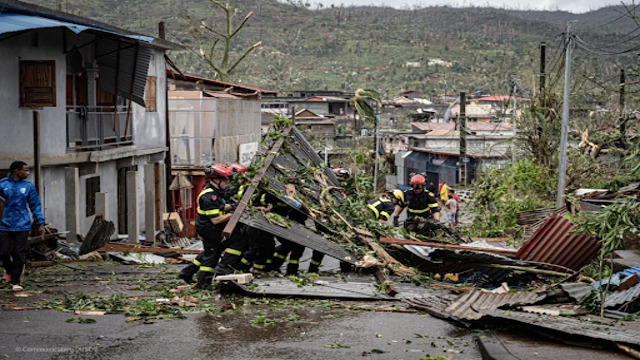
Emergency teams worked tirelessly on Wednesday in storm-ravaged Mayotte. Reuters
Authorities in Mayotte are scrambling to prevent hunger, disease, and lawlessness after Cyclone Chido ravaged the French overseas territory over the weekend. Meanwhile, the storm's devastation in Mozambique has led to dozens of confirmed deaths, highlighting the widespread impact of this catastrophic event.
Mayotte, the hardest hit by Chido’s ferocious winds and torrential rains, is grappling with significant destruction. French officials estimate hundreds, possibly thousands, of fatalities in the archipelago, which is France’s poorest overseas territory. With many areas still unreachable and some victims buried before their deaths could be officially recorded, the true scale of the tragedy remains unclear.
So far, authorities have confirmed 22 deaths and over 1,400 injuries in Mayotte. The mayor of the capital, Mamoudzou, Ambdilwahedou Soumaila, stated that the immediate priority is providing access to clean water and food. “There are decomposing bodies that pose a sanitary risk,” Soumaila explained, adding that the lack of electricity creates further safety concerns, as looting occurs under the cover of darkness.
In response, the French government has mobilized resources, with 20 tonnes of food and water set to arrive by air and sea. Officials aim to restore 50% of water supplies within two days and 95% within a week. To maintain order, a nighttime curfew from 10 p.m. to 4 a.m. has been imposed.
Cyclone Chido has left a trail of destruction in Mayotte, prompting authorities to act quickly to stop the spread of hunger and disease in the French overseas territory. CNN
Cyclone Chido, described by meteorologists as the strongest storm to strike Mayotte in over 90 years, left a trail of devastation as it moved toward mainland Africa. In Mozambique, at least 34 people have been confirmed dead, with another seven fatalities reported in neighboring Malawi. Drone footage from Mozambique’s Cabo Delgado province revealed flattened homes and scattered belongings, exacerbating the ongoing humanitarian crisis caused by an Islamist insurgency in the region.
French President Emmanuel Macron announced plans to visit Mayotte in the coming days following an emergency cabinet meeting. However, the disaster has reignited heated debates over immigration policies, environmental responsibility, and the treatment of France’s overseas territories.
Mayotte, home to about 321,000 residents, has faced rising social unrest fueled by illegal immigration and economic hardship. Approximately one-third of the population is believed to be undocumented migrants, primarily from nearby Comoros and Madagascar. Many undocumented individuals reportedly avoided designated storm shelters, fearing potential arrest.
Residents survey the damage caused by Cyclone Chido in Mecufi district, Cabo Delgado province, Mozambique, on December 16, with trees uprooted and debris scattered everywhere. Reuters
France’s acting Interior Minister, Bruno Retailleau, praised the early warning system's effectiveness but stressed the need for stricter immigration policies. He argued that Mayotte exemplifies broader issues related to France’s handling of migration. However, critics have accused the government of neglecting Mayotte and failing to adequately prepare for climate-related disasters. Socialist Party leader Olivier Faure condemned the focus on immigration, calling for urgent action to address poverty and climate change's role in intensifying natural disasters.
As Mayotte struggles to recover, Prime Minister Francois Bayrou faces criticism for attending a municipal meeting in Pau instead of visiting the disaster-stricken territory, drawing further attention to the government’s response.















